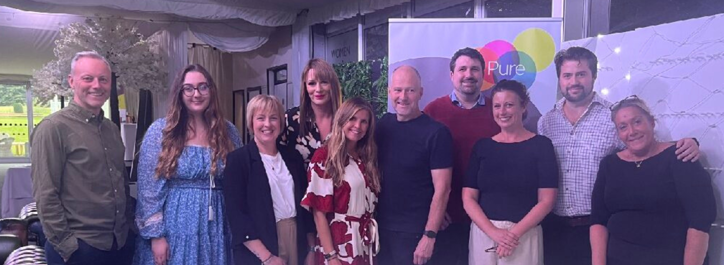Focussing on standing out from the crowd can help charities enhance employer brand as well as increase financial support
At our latest Charity Leaders Group event, organised in partnership with PEM, we welcomed Samantha Loveday from East Anglian Children’s Hospices (EACH) and Alison Taylor of Conscious Communications, as our guest speakers.

This was our first Charity Leaders Group event of 2019. Held at Arthur Rank Hospice in Cambridge it provided a forum for local charity leaders to discuss issues related to the charity and not-for-profit sector. The theme was ‘How to Stand Out’ and it was run as an explorative session looking at how charities can stand out from the crowd when it comes to fundraising, employer brand and public identity.
Samantha Loveday gave an overview of the current fundraising landscape and the challenges faced by the charity sector; including the uncertainty around Brexit and the impact of GDPR regulations. Samantha also revealed that while there has been a positive uptrend in donations from individuals over the last ten years, a key challenge faced by charities is finding ways to stand out amongst millennials. Older people are becoming more charitable with money, as they are in a better position to do so, whereas younger people tend to give time. Charities need to find innovative ways to engage new generations in providing financial support, both now and in the future.
As Samantha talked through potential strategies to build brand awareness and engage new audiences within a crowded market place, we noticed how many of these also correlated with the advice our Director David Culley gave in his session on employer brand. The ways in which charities can stand out to potential donors will also help them stand out to prospective high-calibre employees; helping them to attract and retain the talented teams needed to shape and implement strategies for the future.
One of the considerations discussed was sharing clear messages about a charity’s need for support and providing more emphasis on the direct impact of donations, so that people can really see the difference they have, or could, make. These communications will also help potential employees understand how they could make a difference every day if they were to work for the organisation. While charities and not-for-profit organisations may be concerned about competing for talent based on salaries and benefits, they can compete when it comes to offering a sense of purpose. This is becoming increasingly attractive to new generations entering the workplace. LinkedIn’s latest Workplace Culture report revealed that nine out of ten millennials would consider taking a pay cut to work at a company whose mission and values aligned with their own.
Alison Taylor of Conscious Communications looked at ways charities can manage their reputation at a time when public trust and confidence in charities has dipped due to negative stories. This echoed Samantha’s advice on creating a greater level of transparency to gain confidence in supporting and donating to a charity. In turn, transparency about the culture of an organisation including its values and behaviours will also help to attract the right employees in the first place. David stressed the importance of embedding a consistent culture in the organisation and the need to be constant in all communications and actions. He also advised that employers should never compromise on cultural fit when recruiting, as skills can be developed but natural behaviours cannot.
With the challenge of new generations moving increasingly towards a digital focussed and a potentially cashless society, Samantha also discussed looking at innovative ways to increase the use of online and digital platforms. EACH has continued to find ways to generate support in a virtual world. For example, it has successfully launched a new online retail outlet through its eBay store and also used the online platform to auction off clothes donated by ambassador Ed Sheeran. Increasing social media engagement and the use of digital platforms will raise brand awareness of the charity to new generations; not only as an organisation to support but also as a potential place to work.
Ultimately, the investment charities make to reach new audiences and stand out from the crowd should also have a positive impact on the employer brand. Sharing clear messages about the purpose, impact and culture of the organisation will showcase the charity as an employer of choice and a place where employees can make a difference and have a clear purpose.
The Charity Leaders Group is a unique opportunity for charity executives in the eastern region to hear presentations on topical subjects and to have a sounding board for challenges they may face.
For more information about future events contact David Culley on david.culley@prs.uk.com and join our Charity Leaders Group on LinkedIn




